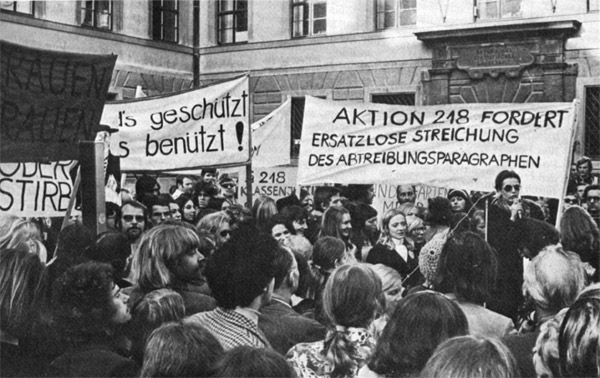Throughout the western world between the end of the 60s and the beginning of the 70s, women started to rise up against inequality. In Germany women within the left party voiced their dissatisfaction with the limited representation of female concerns. Women from different social backgrounds voiced their concerns, too. In 1968, Sigrid Rüger, a member of the Mission for the Liberation of Women, threw a tomato at Hans-Jürgen Krahl, president of the SDS (Socialist German Student Union): Female SDS members protested against repressive patriarchal structures inside the SDS, and demanded the same rights as their male comrades.

Three years later, in 1971, 374 women publicly confessed having had an abortion in the magazine Stern. Their confession became the trigger for a widespread women’s movement in Germany. It was a defining social movement for Germany in the late 20th Century, similar to the women’s movements in other countries of the so-called West. These movements changed the lives of millions of women and men, raised social awareness on equality between men and women and even changed the law. But the historical memory forgets easily. Clichés seem to stick easier than facts: The presumed absence of a woman’s history is one of the biggest obstacles to overcome on the way to true gender equality. Without a past, there can be no future.
Uncomfortable: Feminist Topics
Therefore, the FrauenMediaTurm, which is deeply rooted in the women’s movement, decided to secure and publish the history of the new German feminist movement throughout its decisive years of uprising (from the beginning of the 70s until the beginning of the 80s): the activists’ motives , their methods of protest and objectives as well as the consequences for the entire society.
While studying these documents it becomes evident that feminism is a practice that has been going on for at least 150 years. Staring with the practical, and catching up with theory later. The movement was never ‘only’ about changing society, but about changing the women´s own lives, too.
In order to systematically process, FMT bundles these materials into overarching topics that comprise fights for the right to abortion, initiation of women’s shelters, gender-specific language and many more. Central debates, networks and projects are presented through selected bibliographies, recommended key texts and suggestions for online sources and download links. Content connections are illustrated by a large quantity of images, digitals and cross-references. Together, this provides a lively impression of a lively movement.
We are thanking Bundesministerium für Familie, Senioren, Frauen und Jugend (BMFDFJ) for funding these projects between the years 2012 and 2016.

